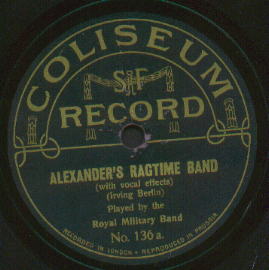 |
 |
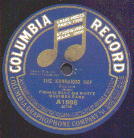 |
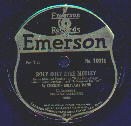 |
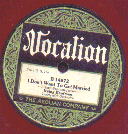 |
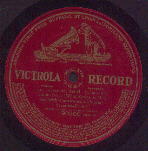 |
|
All selections are in streaming Real Audio. To listen, you will need the Real Player 5.0 or higher. Click on the icon for a free download |
|
Updated August 1999 |
| To play a selection, simply click on the title. To play all selections in the order they appear below, click here. |
| Alexander's
Ragtime Band
Royal Military Band 1912 This early Irving Berlin hit was supposedly played on the maiden voyage of the Titanic. The record's label (pictured above) says that it was "recorded in London, reproduced in Prussia." Lucille Wilbur Sweatman's Original Jazz Band 1919 This was among the first 78 rpms I acquired when I was a child. Unfortunately, the copy I had back then was in terrible condition and the ink on the label had worn so much that I was unable to read the title. Not long ago I found a copy in much better shape and was finally able to learn the name of the song. There was also different song with the same name that was popular in the 1920s. Battleship Connecticut March Arthur Pryor's Band 1908 My Dough Boy - One Step Joseph C. Smith's Orchestra 1918 American infantrymen during World War I were called "doughboys." Linger Awhile Paul Whiteman and His Orchestra 1924 This pretty tune was a successful seller for Whiteman. In the early 1920's, Whiteman's was the highest paid band in America. Demand for his orchestra was so great that, at one point he had dozens of satellite "Whiteman Orchestras" appearing in clubs, theatres, cabarets and ocean liners throughout the country and even in some foreign countries. My Pappa Doesn't Two-time No Time Fletcher Henderson and His Orchestra 1924 Here is a recording that I am especially happy to be able to introduce to a new audience. I am especially fond the uncredited "scat" vocal. Until I was putting this update together, the existence of this recording in my collection had somehow gone unnoticed. What a nice surprise! A lot of people have a tendency to overlook fine performances from the acoustical era in favor of much clearer electrical recordings. Sadly, I am sometimes guilty of that myself. Maurice Hesitation Waltz Victor Military Band 1914 One of the things I don't like about many pre-1920s recordings is that the arrangements are sometimes repetitive and sound as if they are simply trying to fill up the rest of the record. This one is especially obvious, probably in part because it is on a 12 inch record rather than the more standard 10 inch ones. For example, the band blandly repeats the opening passage 4 times before moving on to something else - and the rest of the record is similarly stretched out. The music itself is very nice, which is why I include it - but I think this record would be much more enjoyable if it were somewhat condensed. Lucia Sextette, Act II "Chi mi Frena" (What Restrains Me) (Donizette) Marcella Sembrich, Enrico Caruso, Antonio Scotti, Marcel Journet, Gina Severina, Francesco Daddi 1908 This recording is a "who's who" of turn of the century opera greats. Though the Victor Talking Machine targeted all of its classical and operatic Red Seal records towards an affluent audience, this particular record (pictured at the top of this page) caused a real stir when it was released because it carried a hefty $7 price tag. Keep in mind that, in 1908, $7 was roughly equivalent to $116 in 1999 dollars!* And just what did well-to-do opera fans get for that kind of money? Exactly what you hear. It was a one-sided 12 inch disc with less than 4 minutes of playing time. Most Red Seal Records, however, were more affordable: they only cost $1.50 - or about $25 in today's dollars! * *NOTE: The basis for the above price comparisons is the Cost Of Living Calculator at the American Institute For Economic Research's website. Since the calculator only goes back to 1913, that is the year I used for the comparisons. Roly Boly Eyes Medley Emerson Military Band 1919 That Mesmerizing Mendelsohn Tune Collins and Harlan 1910 Here is another early Irving Berlin rag that was supposedly played on the Titanic. Be warned that this particular version features a short "darky" comedy routine - though it is mild compared to other stuff from the era. Such racial stereotypes were common in early 20th century America. Certainly this is an aspect of the era that does not deserve our nostalgia. Bebe Cameo Dance Orchestra 1923 "Cameo" refers to Cameo Records. Dance of The Demon Victor Arden - Phil Ohman 1923 Arden and Ohman were a famous piano team. In addition to records, they also cut paper player piano rolls. Dardanella Prince's Dance Orchestra 1919 This song's title refers to the narrow channel connecting the Aegean Sea to the Sea of Marmara that separates Europe from Asia. Ben Selvin's recording of this was a huge seller. I have the Selvin version, but I think this one is better. Neither of them, however, compare to Paul Whiteman's 1927 version arranged by Bill Challis - which, to me, will always be the definitive version. Milenberg Joys The Cotton Pickers 1925 Here is a song that is still performed today, usually by Dixieland bands. This group was a Brunswick Records house band and featured such jazz greats as Frankie Trumbauer and Miff Mole. While the band was staffed entirely by white musicians, its name was most likely chosen in an attempt to cash in on the popularity of "hot" black jazz bands. Ivanhoe - Two Step Arthur Pryor's Band 1908 I Want To Be Happy Carl Fenton's Orchestra 1924 This song is from the musical "No No Nanette." Irresistible - Tango Argentine Victor Military Band 1914 I Don't Want To Get Married Irving Kaufman 1925 Up through the 1930s, one sometimes finds recordings where male vocalists would sing lyrics that were written for ladies and vice versa. The results are sometimes quite amusing. I have been told that one of the possible reasons was because some record company executives were afraid of potential legal consequences if lyrics were altered in any way - even changing "he" to "she." Apparently such records did not cause scandal - though one would think that they would considering the societal attitudes of the times. This selection is a bit unusual because, in the final chorus, Kaufman ultimately does change the gender in the lyrics. The Kangaroo Hop Blue And White Marimba Band 1916 I have featured this group in previous updates. I really like the sound of these old marimba bands - especially when they play ragtime. |
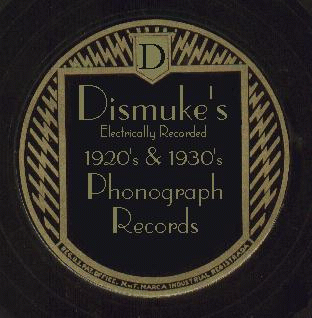 |
|
|
|
|
|
|
|
|